Work-Based Learning: Project Management for Introducing Face Recognition Technology in Tower Hotel
VerifiedAdded on 2023/06/15
|11
|3244
|274
AI Summary
This report discusses the project management process for introducing face recognition technology in Tower Hotel. It covers setting targets, aims and objectives, monitoring and evaluating the progress of the project, and the benefits of each stage. The report also includes SWOT and PESTEL analysis to evaluate the strengths, weaknesses, opportunities, threats and external factors that can impact the project. The new technology can help Tower Hotel to reduce human interaction during the pandemic and save time for customers, and gain a competitive advantage in the hospitality industry.
Contribute Materials
Your contribution can guide someone’s learning journey. Share your
documents today.
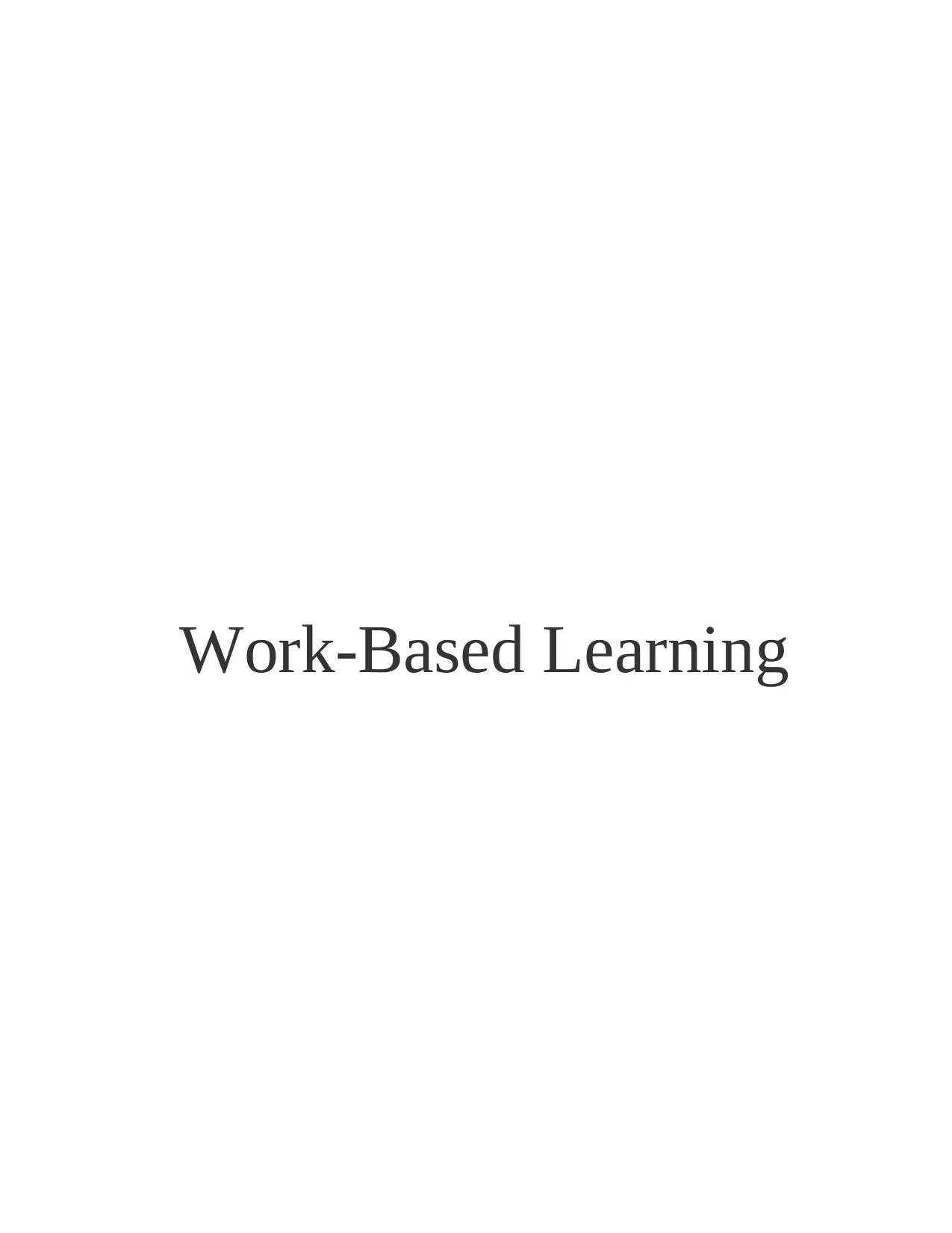
Work-Based Learning
Secure Best Marks with AI Grader
Need help grading? Try our AI Grader for instant feedback on your assignments.
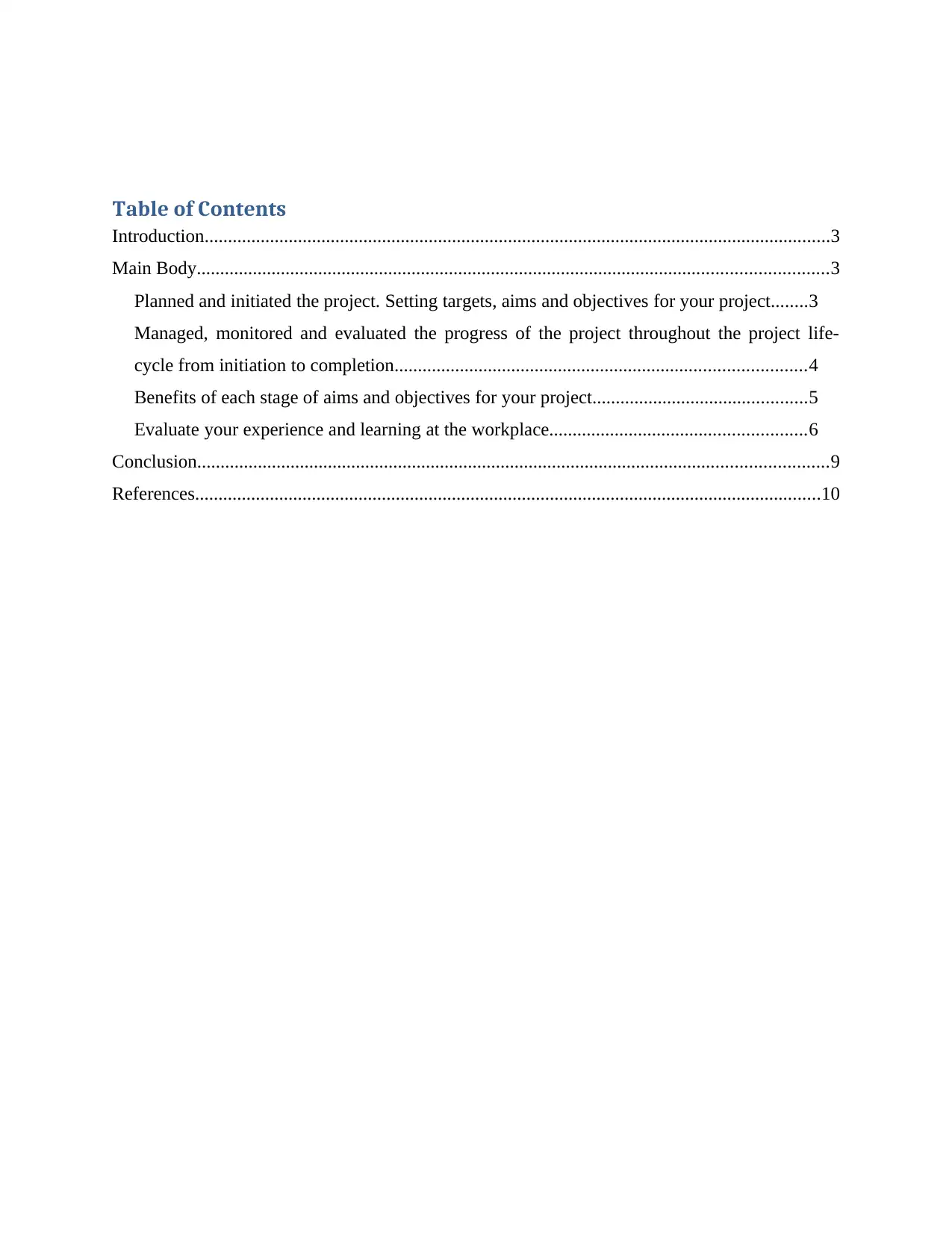
Table of Contents
Introduction......................................................................................................................................3
Main Body.......................................................................................................................................3
Planned and initiated the project. Setting targets, aims and objectives for your project........3
Managed, monitored and evaluated the progress of the project throughout the project life-
cycle from initiation to completion........................................................................................4
Benefits of each stage of aims and objectives for your project..............................................5
Evaluate your experience and learning at the workplace.......................................................6
Conclusion.......................................................................................................................................9
References......................................................................................................................................10
Introduction......................................................................................................................................3
Main Body.......................................................................................................................................3
Planned and initiated the project. Setting targets, aims and objectives for your project........3
Managed, monitored and evaluated the progress of the project throughout the project life-
cycle from initiation to completion........................................................................................4
Benefits of each stage of aims and objectives for your project..............................................5
Evaluate your experience and learning at the workplace.......................................................6
Conclusion.......................................................................................................................................9
References......................................................................................................................................10
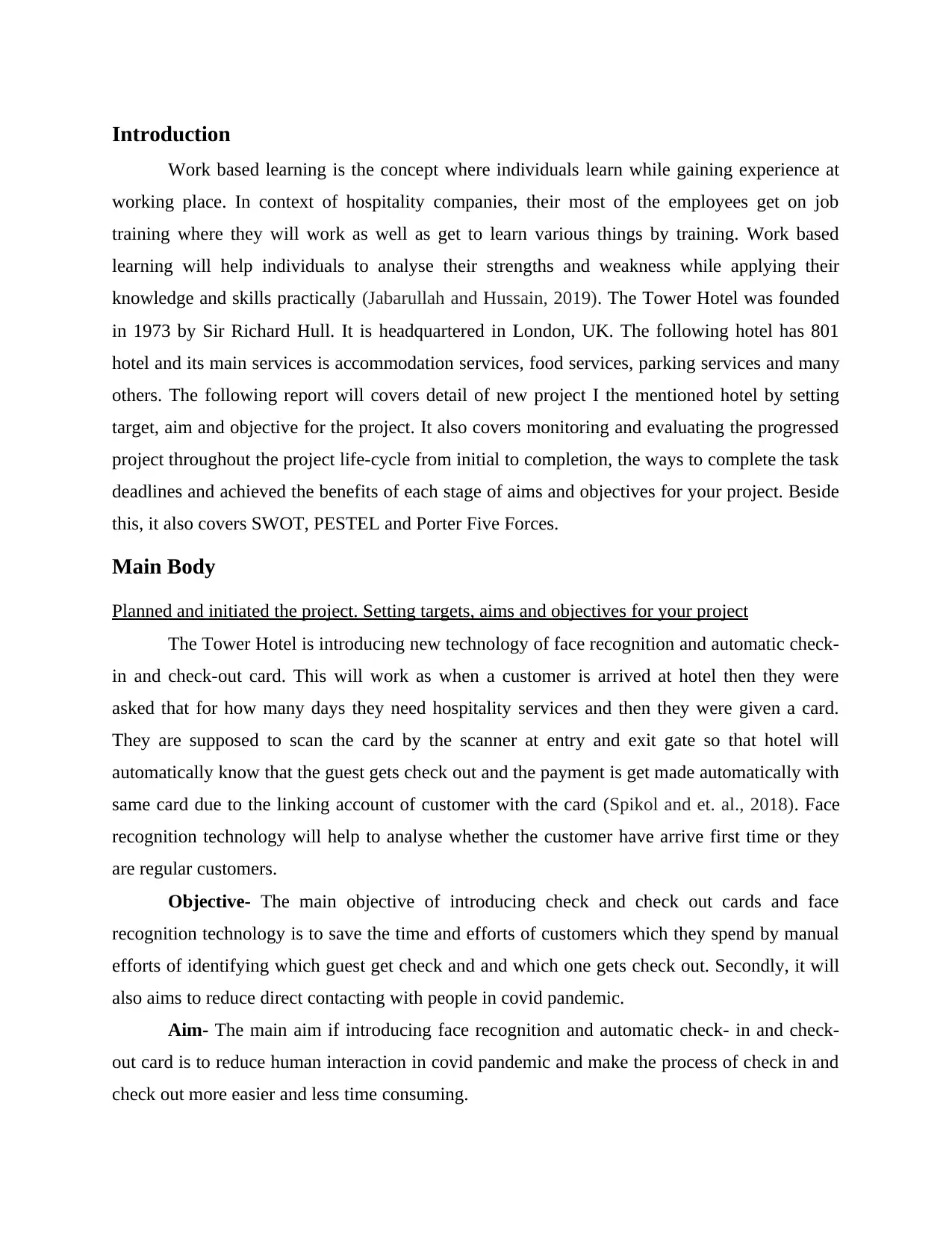
Introduction
Work based learning is the concept where individuals learn while gaining experience at
working place. In context of hospitality companies, their most of the employees get on job
training where they will work as well as get to learn various things by training. Work based
learning will help individuals to analyse their strengths and weakness while applying their
knowledge and skills practically (Jabarullah and Hussain, 2019). The Tower Hotel was founded
in 1973 by Sir Richard Hull. It is headquartered in London, UK. The following hotel has 801
hotel and its main services is accommodation services, food services, parking services and many
others. The following report will covers detail of new project I the mentioned hotel by setting
target, aim and objective for the project. It also covers monitoring and evaluating the progressed
project throughout the project life-cycle from initial to completion, the ways to complete the task
deadlines and achieved the benefits of each stage of aims and objectives for your project. Beside
this, it also covers SWOT, PESTEL and Porter Five Forces.
Main Body
Planned and initiated the project. Setting targets, aims and objectives for your project
The Tower Hotel is introducing new technology of face recognition and automatic check-
in and check-out card. This will work as when a customer is arrived at hotel then they were
asked that for how many days they need hospitality services and then they were given a card.
They are supposed to scan the card by the scanner at entry and exit gate so that hotel will
automatically know that the guest gets check out and the payment is get made automatically with
same card due to the linking account of customer with the card (Spikol and et. al., 2018). Face
recognition technology will help to analyse whether the customer have arrive first time or they
are regular customers.
Objective- The main objective of introducing check and check out cards and face
recognition technology is to save the time and efforts of customers which they spend by manual
efforts of identifying which guest get check and and which one gets check out. Secondly, it will
also aims to reduce direct contacting with people in covid pandemic.
Aim- The main aim if introducing face recognition and automatic check- in and check-
out card is to reduce human interaction in covid pandemic and make the process of check in and
check out more easier and less time consuming.
Work based learning is the concept where individuals learn while gaining experience at
working place. In context of hospitality companies, their most of the employees get on job
training where they will work as well as get to learn various things by training. Work based
learning will help individuals to analyse their strengths and weakness while applying their
knowledge and skills practically (Jabarullah and Hussain, 2019). The Tower Hotel was founded
in 1973 by Sir Richard Hull. It is headquartered in London, UK. The following hotel has 801
hotel and its main services is accommodation services, food services, parking services and many
others. The following report will covers detail of new project I the mentioned hotel by setting
target, aim and objective for the project. It also covers monitoring and evaluating the progressed
project throughout the project life-cycle from initial to completion, the ways to complete the task
deadlines and achieved the benefits of each stage of aims and objectives for your project. Beside
this, it also covers SWOT, PESTEL and Porter Five Forces.
Main Body
Planned and initiated the project. Setting targets, aims and objectives for your project
The Tower Hotel is introducing new technology of face recognition and automatic check-
in and check-out card. This will work as when a customer is arrived at hotel then they were
asked that for how many days they need hospitality services and then they were given a card.
They are supposed to scan the card by the scanner at entry and exit gate so that hotel will
automatically know that the guest gets check out and the payment is get made automatically with
same card due to the linking account of customer with the card (Spikol and et. al., 2018). Face
recognition technology will help to analyse whether the customer have arrive first time or they
are regular customers.
Objective- The main objective of introducing check and check out cards and face
recognition technology is to save the time and efforts of customers which they spend by manual
efforts of identifying which guest get check and and which one gets check out. Secondly, it will
also aims to reduce direct contacting with people in covid pandemic.
Aim- The main aim if introducing face recognition and automatic check- in and check-
out card is to reduce human interaction in covid pandemic and make the process of check in and
check out more easier and less time consuming.
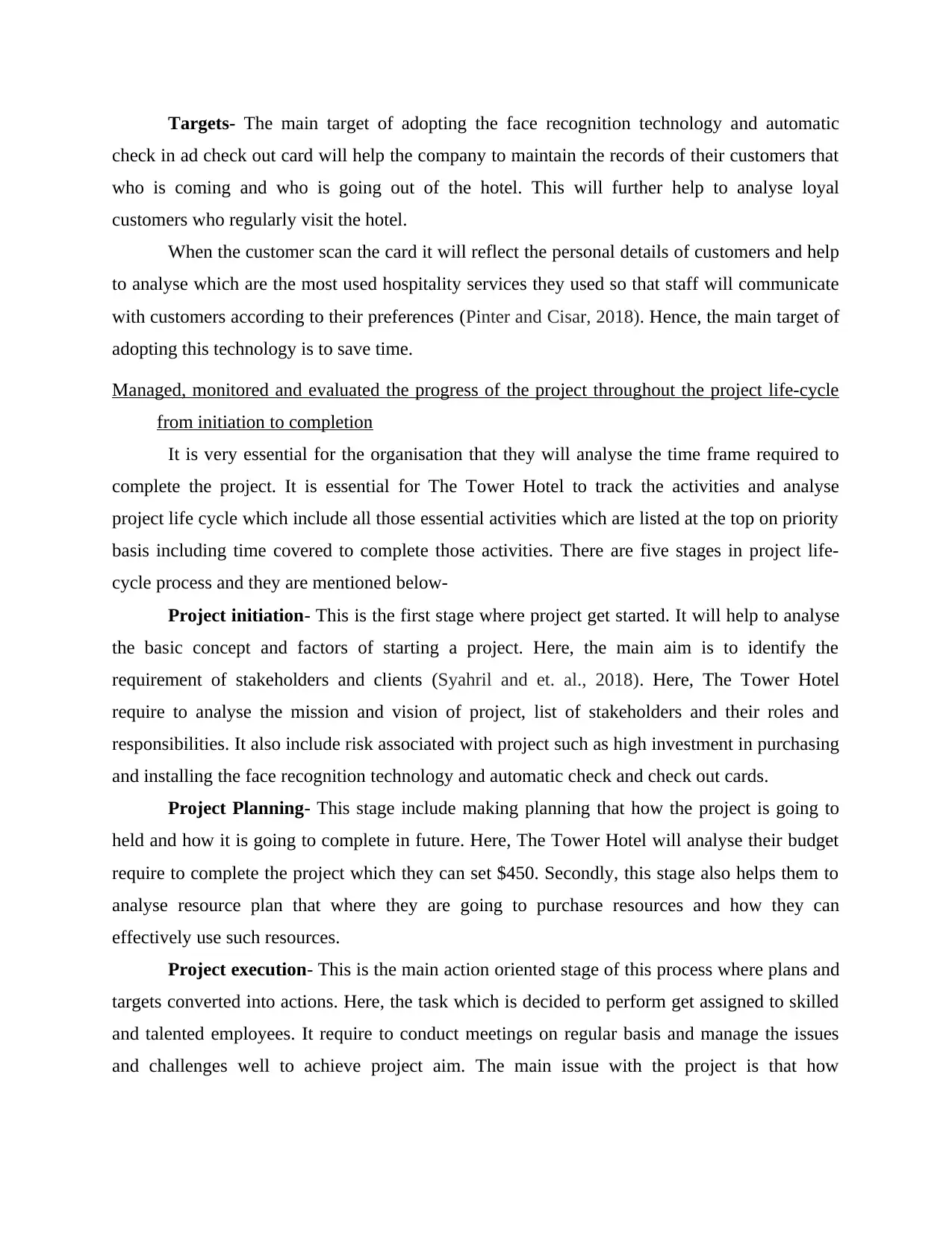
Targets- The main target of adopting the face recognition technology and automatic
check in ad check out card will help the company to maintain the records of their customers that
who is coming and who is going out of the hotel. This will further help to analyse loyal
customers who regularly visit the hotel.
When the customer scan the card it will reflect the personal details of customers and help
to analyse which are the most used hospitality services they used so that staff will communicate
with customers according to their preferences (Pinter and Cisar, 2018). Hence, the main target of
adopting this technology is to save time.
Managed, monitored and evaluated the progress of the project throughout the project life-cycle
from initiation to completion
It is very essential for the organisation that they will analyse the time frame required to
complete the project. It is essential for The Tower Hotel to track the activities and analyse
project life cycle which include all those essential activities which are listed at the top on priority
basis including time covered to complete those activities. There are five stages in project life-
cycle process and they are mentioned below-
Project initiation- This is the first stage where project get started. It will help to analyse
the basic concept and factors of starting a project. Here, the main aim is to identify the
requirement of stakeholders and clients (Syahril and et. al., 2018). Here, The Tower Hotel
require to analyse the mission and vision of project, list of stakeholders and their roles and
responsibilities. It also include risk associated with project such as high investment in purchasing
and installing the face recognition technology and automatic check and check out cards.
Project Planning- This stage include making planning that how the project is going to
held and how it is going to complete in future. Here, The Tower Hotel will analyse their budget
require to complete the project which they can set $450. Secondly, this stage also helps them to
analyse resource plan that where they are going to purchase resources and how they can
effectively use such resources.
Project execution- This is the main action oriented stage of this process where plans and
targets converted into actions. Here, the task which is decided to perform get assigned to skilled
and talented employees. It require to conduct meetings on regular basis and manage the issues
and challenges well to achieve project aim. The main issue with the project is that how
check in ad check out card will help the company to maintain the records of their customers that
who is coming and who is going out of the hotel. This will further help to analyse loyal
customers who regularly visit the hotel.
When the customer scan the card it will reflect the personal details of customers and help
to analyse which are the most used hospitality services they used so that staff will communicate
with customers according to their preferences (Pinter and Cisar, 2018). Hence, the main target of
adopting this technology is to save time.
Managed, monitored and evaluated the progress of the project throughout the project life-cycle
from initiation to completion
It is very essential for the organisation that they will analyse the time frame required to
complete the project. It is essential for The Tower Hotel to track the activities and analyse
project life cycle which include all those essential activities which are listed at the top on priority
basis including time covered to complete those activities. There are five stages in project life-
cycle process and they are mentioned below-
Project initiation- This is the first stage where project get started. It will help to analyse
the basic concept and factors of starting a project. Here, the main aim is to identify the
requirement of stakeholders and clients (Syahril and et. al., 2018). Here, The Tower Hotel
require to analyse the mission and vision of project, list of stakeholders and their roles and
responsibilities. It also include risk associated with project such as high investment in purchasing
and installing the face recognition technology and automatic check and check out cards.
Project Planning- This stage include making planning that how the project is going to
held and how it is going to complete in future. Here, The Tower Hotel will analyse their budget
require to complete the project which they can set $450. Secondly, this stage also helps them to
analyse resource plan that where they are going to purchase resources and how they can
effectively use such resources.
Project execution- This is the main action oriented stage of this process where plans and
targets converted into actions. Here, the task which is decided to perform get assigned to skilled
and talented employees. It require to conduct meetings on regular basis and manage the issues
and challenges well to achieve project aim. The main issue with the project is that how
Secure Best Marks with AI Grader
Need help grading? Try our AI Grader for instant feedback on your assignments.
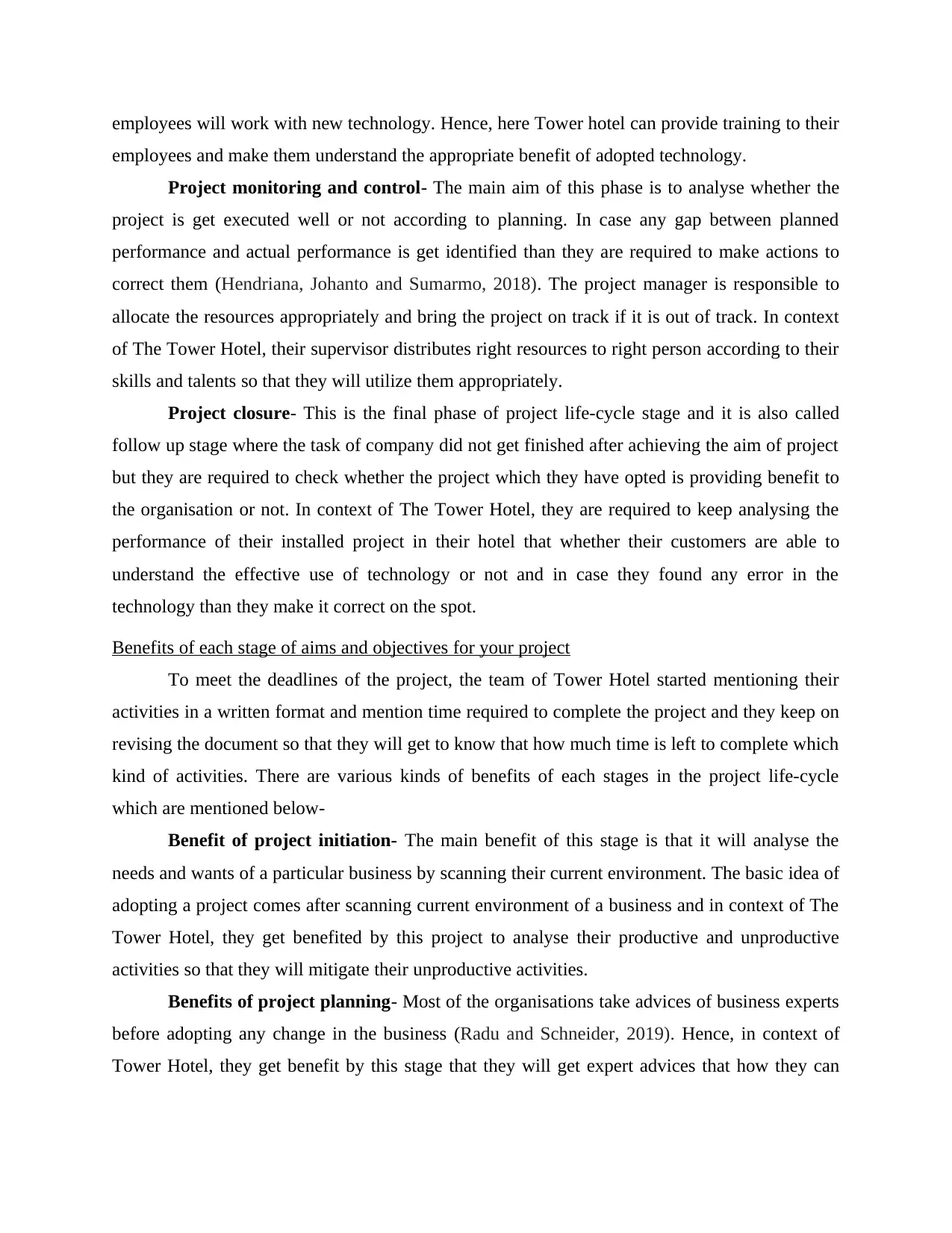
employees will work with new technology. Hence, here Tower hotel can provide training to their
employees and make them understand the appropriate benefit of adopted technology.
Project monitoring and control- The main aim of this phase is to analyse whether the
project is get executed well or not according to planning. In case any gap between planned
performance and actual performance is get identified than they are required to make actions to
correct them (Hendriana, Johanto and Sumarmo, 2018). The project manager is responsible to
allocate the resources appropriately and bring the project on track if it is out of track. In context
of The Tower Hotel, their supervisor distributes right resources to right person according to their
skills and talents so that they will utilize them appropriately.
Project closure- This is the final phase of project life-cycle stage and it is also called
follow up stage where the task of company did not get finished after achieving the aim of project
but they are required to check whether the project which they have opted is providing benefit to
the organisation or not. In context of The Tower Hotel, they are required to keep analysing the
performance of their installed project in their hotel that whether their customers are able to
understand the effective use of technology or not and in case they found any error in the
technology than they make it correct on the spot.
Benefits of each stage of aims and objectives for your project
To meet the deadlines of the project, the team of Tower Hotel started mentioning their
activities in a written format and mention time required to complete the project and they keep on
revising the document so that they will get to know that how much time is left to complete which
kind of activities. There are various kinds of benefits of each stages in the project life-cycle
which are mentioned below-
Benefit of project initiation- The main benefit of this stage is that it will analyse the
needs and wants of a particular business by scanning their current environment. The basic idea of
adopting a project comes after scanning current environment of a business and in context of The
Tower Hotel, they get benefited by this project to analyse their productive and unproductive
activities so that they will mitigate their unproductive activities.
Benefits of project planning- Most of the organisations take advices of business experts
before adopting any change in the business (Radu and Schneider, 2019). Hence, in context of
Tower Hotel, they get benefit by this stage that they will get expert advices that how they can
employees and make them understand the appropriate benefit of adopted technology.
Project monitoring and control- The main aim of this phase is to analyse whether the
project is get executed well or not according to planning. In case any gap between planned
performance and actual performance is get identified than they are required to make actions to
correct them (Hendriana, Johanto and Sumarmo, 2018). The project manager is responsible to
allocate the resources appropriately and bring the project on track if it is out of track. In context
of The Tower Hotel, their supervisor distributes right resources to right person according to their
skills and talents so that they will utilize them appropriately.
Project closure- This is the final phase of project life-cycle stage and it is also called
follow up stage where the task of company did not get finished after achieving the aim of project
but they are required to check whether the project which they have opted is providing benefit to
the organisation or not. In context of The Tower Hotel, they are required to keep analysing the
performance of their installed project in their hotel that whether their customers are able to
understand the effective use of technology or not and in case they found any error in the
technology than they make it correct on the spot.
Benefits of each stage of aims and objectives for your project
To meet the deadlines of the project, the team of Tower Hotel started mentioning their
activities in a written format and mention time required to complete the project and they keep on
revising the document so that they will get to know that how much time is left to complete which
kind of activities. There are various kinds of benefits of each stages in the project life-cycle
which are mentioned below-
Benefit of project initiation- The main benefit of this stage is that it will analyse the
needs and wants of a particular business by scanning their current environment. The basic idea of
adopting a project comes after scanning current environment of a business and in context of The
Tower Hotel, they get benefited by this project to analyse their productive and unproductive
activities so that they will mitigate their unproductive activities.
Benefits of project planning- Most of the organisations take advices of business experts
before adopting any change in the business (Radu and Schneider, 2019). Hence, in context of
Tower Hotel, they get benefit by this stage that they will get expert advices that how they can
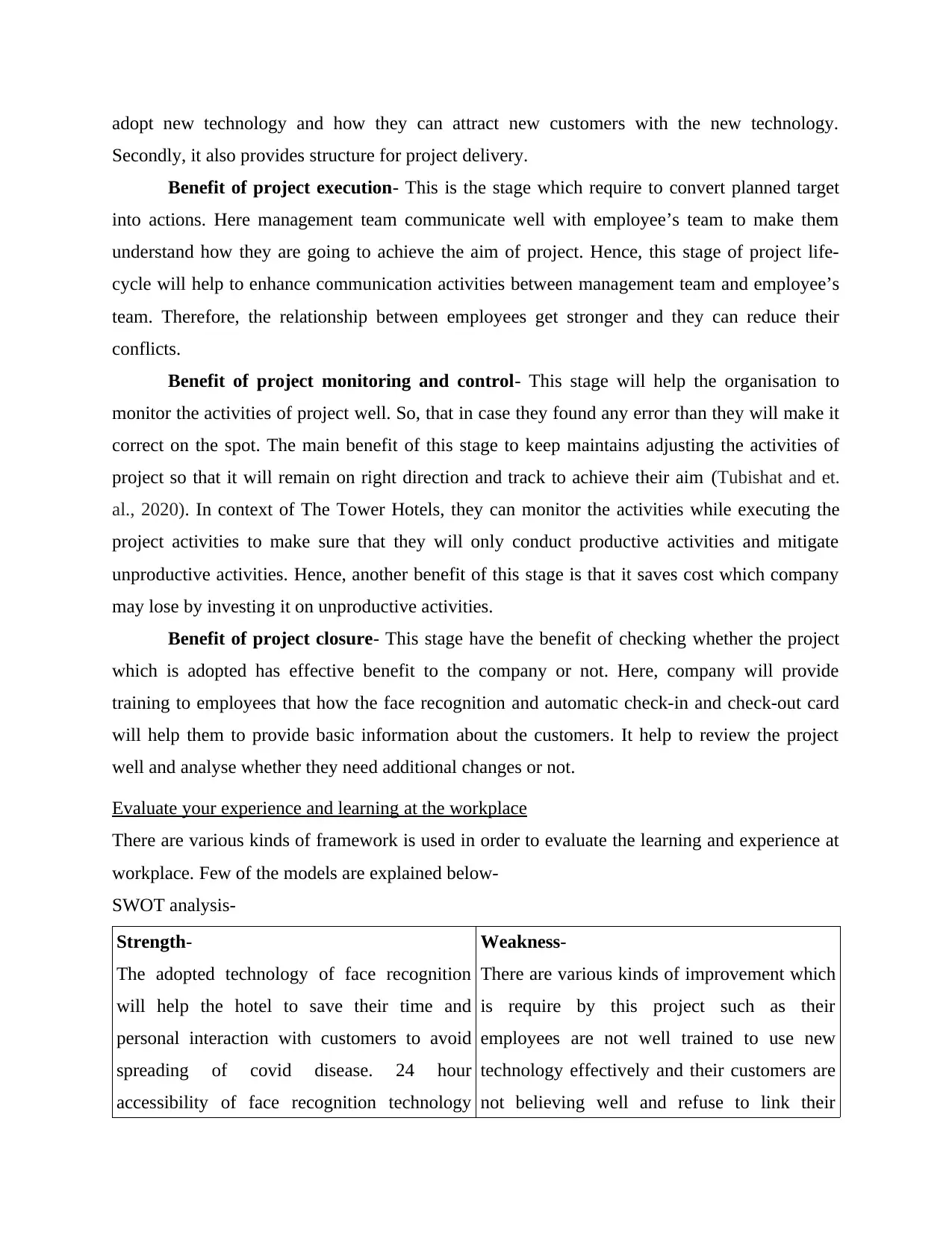
adopt new technology and how they can attract new customers with the new technology.
Secondly, it also provides structure for project delivery.
Benefit of project execution- This is the stage which require to convert planned target
into actions. Here management team communicate well with employee’s team to make them
understand how they are going to achieve the aim of project. Hence, this stage of project life-
cycle will help to enhance communication activities between management team and employee’s
team. Therefore, the relationship between employees get stronger and they can reduce their
conflicts.
Benefit of project monitoring and control- This stage will help the organisation to
monitor the activities of project well. So, that in case they found any error than they will make it
correct on the spot. The main benefit of this stage to keep maintains adjusting the activities of
project so that it will remain on right direction and track to achieve their aim (Tubishat and et.
al., 2020). In context of The Tower Hotels, they can monitor the activities while executing the
project activities to make sure that they will only conduct productive activities and mitigate
unproductive activities. Hence, another benefit of this stage is that it saves cost which company
may lose by investing it on unproductive activities.
Benefit of project closure- This stage have the benefit of checking whether the project
which is adopted has effective benefit to the company or not. Here, company will provide
training to employees that how the face recognition and automatic check-in and check-out card
will help them to provide basic information about the customers. It help to review the project
well and analyse whether they need additional changes or not.
Evaluate your experience and learning at the workplace
There are various kinds of framework is used in order to evaluate the learning and experience at
workplace. Few of the models are explained below-
SWOT analysis-
Strength-
The adopted technology of face recognition
will help the hotel to save their time and
personal interaction with customers to avoid
spreading of covid disease. 24 hour
accessibility of face recognition technology
Weakness-
There are various kinds of improvement which
is require by this project such as their
employees are not well trained to use new
technology effectively and their customers are
not believing well and refuse to link their
Secondly, it also provides structure for project delivery.
Benefit of project execution- This is the stage which require to convert planned target
into actions. Here management team communicate well with employee’s team to make them
understand how they are going to achieve the aim of project. Hence, this stage of project life-
cycle will help to enhance communication activities between management team and employee’s
team. Therefore, the relationship between employees get stronger and they can reduce their
conflicts.
Benefit of project monitoring and control- This stage will help the organisation to
monitor the activities of project well. So, that in case they found any error than they will make it
correct on the spot. The main benefit of this stage to keep maintains adjusting the activities of
project so that it will remain on right direction and track to achieve their aim (Tubishat and et.
al., 2020). In context of The Tower Hotels, they can monitor the activities while executing the
project activities to make sure that they will only conduct productive activities and mitigate
unproductive activities. Hence, another benefit of this stage is that it saves cost which company
may lose by investing it on unproductive activities.
Benefit of project closure- This stage have the benefit of checking whether the project
which is adopted has effective benefit to the company or not. Here, company will provide
training to employees that how the face recognition and automatic check-in and check-out card
will help them to provide basic information about the customers. It help to review the project
well and analyse whether they need additional changes or not.
Evaluate your experience and learning at the workplace
There are various kinds of framework is used in order to evaluate the learning and experience at
workplace. Few of the models are explained below-
SWOT analysis-
Strength-
The adopted technology of face recognition
will help the hotel to save their time and
personal interaction with customers to avoid
spreading of covid disease. 24 hour
accessibility of face recognition technology
Weakness-
There are various kinds of improvement which
is require by this project such as their
employees are not well trained to use new
technology effectively and their customers are
not believing well and refuse to link their
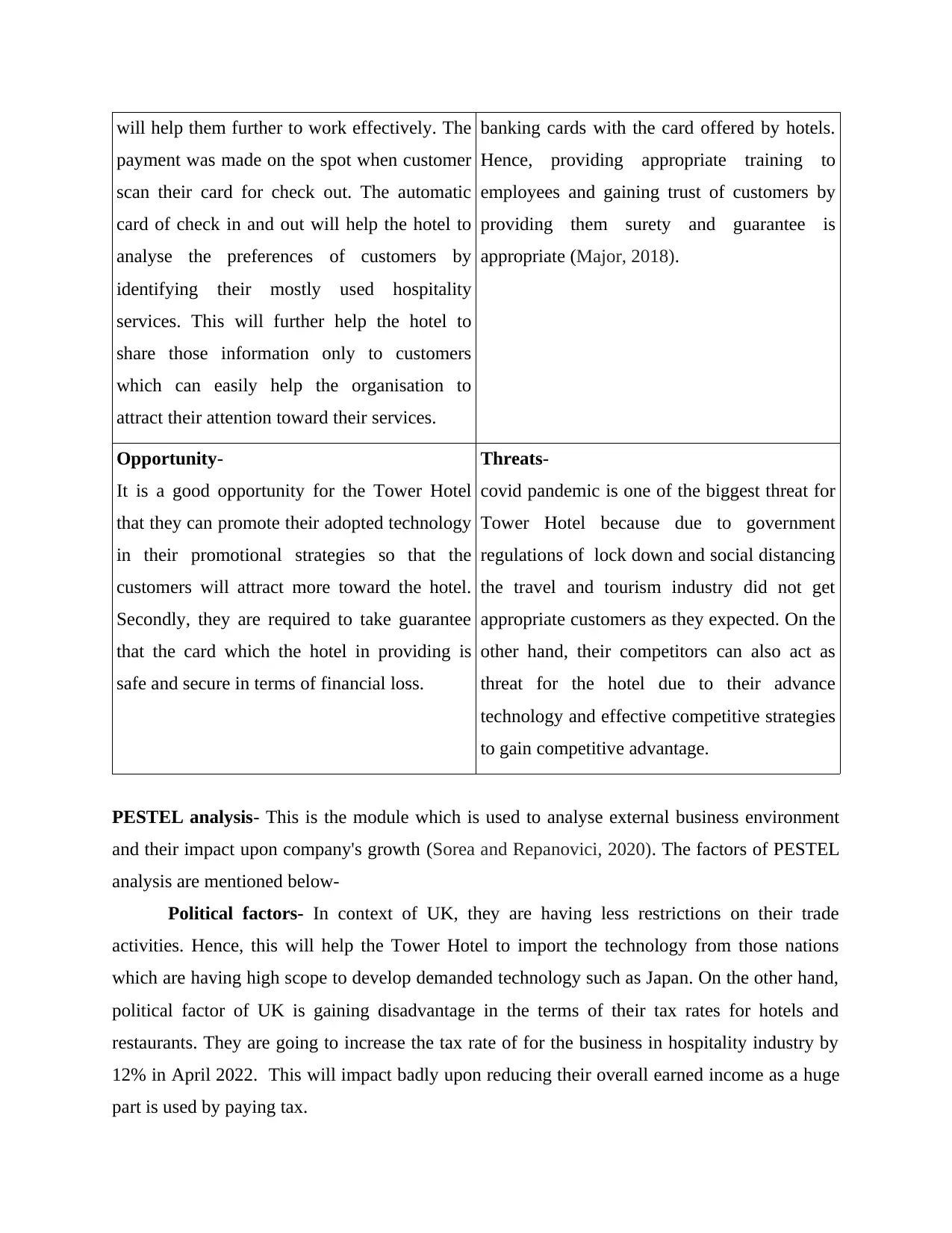
will help them further to work effectively. The
payment was made on the spot when customer
scan their card for check out. The automatic
card of check in and out will help the hotel to
analyse the preferences of customers by
identifying their mostly used hospitality
services. This will further help the hotel to
share those information only to customers
which can easily help the organisation to
attract their attention toward their services.
banking cards with the card offered by hotels.
Hence, providing appropriate training to
employees and gaining trust of customers by
providing them surety and guarantee is
appropriate (Major, 2018).
Opportunity-
It is a good opportunity for the Tower Hotel
that they can promote their adopted technology
in their promotional strategies so that the
customers will attract more toward the hotel.
Secondly, they are required to take guarantee
that the card which the hotel in providing is
safe and secure in terms of financial loss.
Threats-
covid pandemic is one of the biggest threat for
Tower Hotel because due to government
regulations of lock down and social distancing
the travel and tourism industry did not get
appropriate customers as they expected. On the
other hand, their competitors can also act as
threat for the hotel due to their advance
technology and effective competitive strategies
to gain competitive advantage.
PESTEL analysis- This is the module which is used to analyse external business environment
and their impact upon company's growth (Sorea and Repanovici, 2020). The factors of PESTEL
analysis are mentioned below-
Political factors- In context of UK, they are having less restrictions on their trade
activities. Hence, this will help the Tower Hotel to import the technology from those nations
which are having high scope to develop demanded technology such as Japan. On the other hand,
political factor of UK is gaining disadvantage in the terms of their tax rates for hotels and
restaurants. They are going to increase the tax rate of for the business in hospitality industry by
12% in April 2022. This will impact badly upon reducing their overall earned income as a huge
part is used by paying tax.
payment was made on the spot when customer
scan their card for check out. The automatic
card of check in and out will help the hotel to
analyse the preferences of customers by
identifying their mostly used hospitality
services. This will further help the hotel to
share those information only to customers
which can easily help the organisation to
attract their attention toward their services.
banking cards with the card offered by hotels.
Hence, providing appropriate training to
employees and gaining trust of customers by
providing them surety and guarantee is
appropriate (Major, 2018).
Opportunity-
It is a good opportunity for the Tower Hotel
that they can promote their adopted technology
in their promotional strategies so that the
customers will attract more toward the hotel.
Secondly, they are required to take guarantee
that the card which the hotel in providing is
safe and secure in terms of financial loss.
Threats-
covid pandemic is one of the biggest threat for
Tower Hotel because due to government
regulations of lock down and social distancing
the travel and tourism industry did not get
appropriate customers as they expected. On the
other hand, their competitors can also act as
threat for the hotel due to their advance
technology and effective competitive strategies
to gain competitive advantage.
PESTEL analysis- This is the module which is used to analyse external business environment
and their impact upon company's growth (Sorea and Repanovici, 2020). The factors of PESTEL
analysis are mentioned below-
Political factors- In context of UK, they are having less restrictions on their trade
activities. Hence, this will help the Tower Hotel to import the technology from those nations
which are having high scope to develop demanded technology such as Japan. On the other hand,
political factor of UK is gaining disadvantage in the terms of their tax rates for hotels and
restaurants. They are going to increase the tax rate of for the business in hospitality industry by
12% in April 2022. This will impact badly upon reducing their overall earned income as a huge
part is used by paying tax.
Paraphrase This Document
Need a fresh take? Get an instant paraphrase of this document with our AI Paraphraser
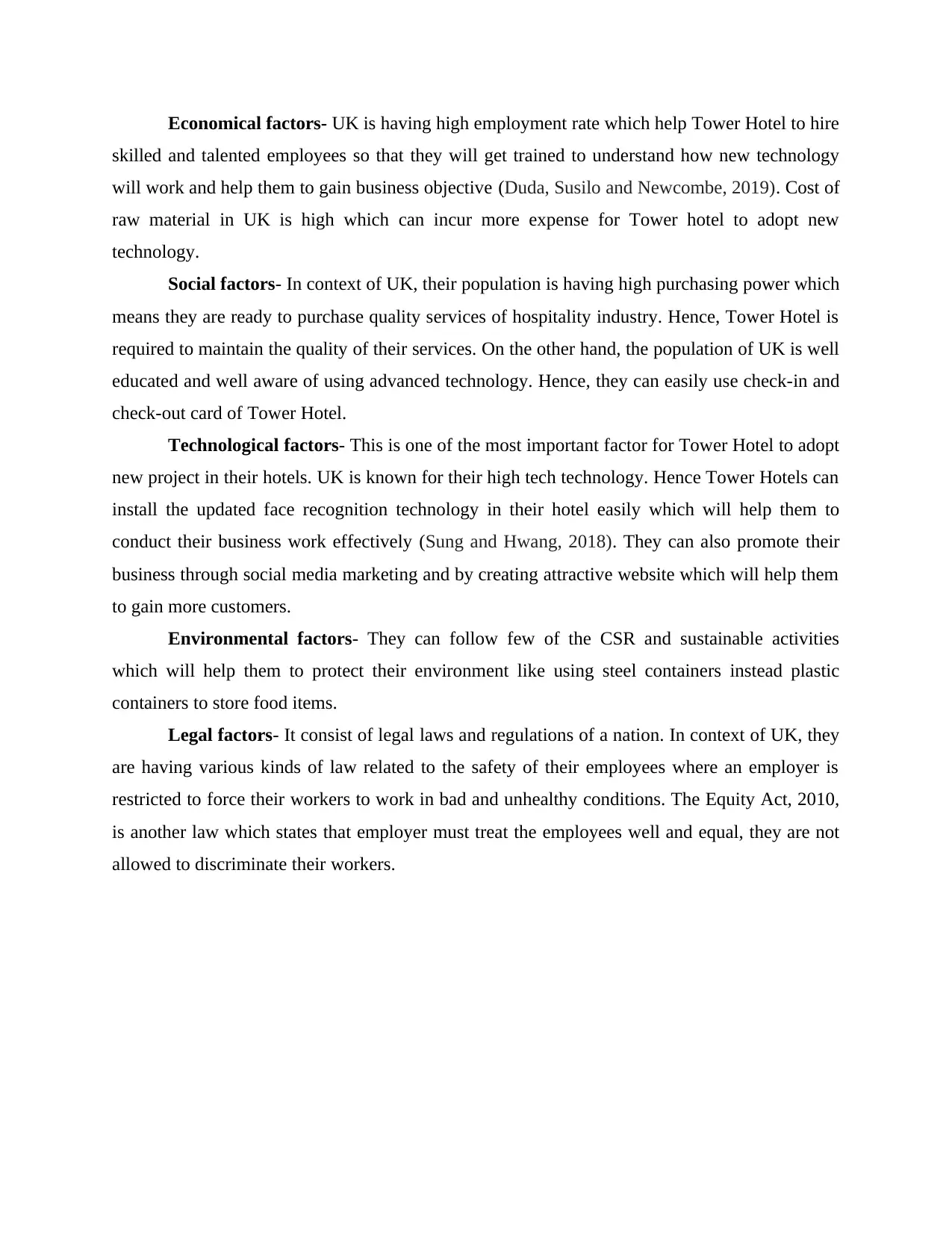
Economical factors- UK is having high employment rate which help Tower Hotel to hire
skilled and talented employees so that they will get trained to understand how new technology
will work and help them to gain business objective (Duda, Susilo and Newcombe, 2019). Cost of
raw material in UK is high which can incur more expense for Tower hotel to adopt new
technology.
Social factors- In context of UK, their population is having high purchasing power which
means they are ready to purchase quality services of hospitality industry. Hence, Tower Hotel is
required to maintain the quality of their services. On the other hand, the population of UK is well
educated and well aware of using advanced technology. Hence, they can easily use check-in and
check-out card of Tower Hotel.
Technological factors- This is one of the most important factor for Tower Hotel to adopt
new project in their hotels. UK is known for their high tech technology. Hence Tower Hotels can
install the updated face recognition technology in their hotel easily which will help them to
conduct their business work effectively (Sung and Hwang, 2018). They can also promote their
business through social media marketing and by creating attractive website which will help them
to gain more customers.
Environmental factors- They can follow few of the CSR and sustainable activities
which will help them to protect their environment like using steel containers instead plastic
containers to store food items.
Legal factors- It consist of legal laws and regulations of a nation. In context of UK, they
are having various kinds of law related to the safety of their employees where an employer is
restricted to force their workers to work in bad and unhealthy conditions. The Equity Act, 2010,
is another law which states that employer must treat the employees well and equal, they are not
allowed to discriminate their workers.
skilled and talented employees so that they will get trained to understand how new technology
will work and help them to gain business objective (Duda, Susilo and Newcombe, 2019). Cost of
raw material in UK is high which can incur more expense for Tower hotel to adopt new
technology.
Social factors- In context of UK, their population is having high purchasing power which
means they are ready to purchase quality services of hospitality industry. Hence, Tower Hotel is
required to maintain the quality of their services. On the other hand, the population of UK is well
educated and well aware of using advanced technology. Hence, they can easily use check-in and
check-out card of Tower Hotel.
Technological factors- This is one of the most important factor for Tower Hotel to adopt
new project in their hotels. UK is known for their high tech technology. Hence Tower Hotels can
install the updated face recognition technology in their hotel easily which will help them to
conduct their business work effectively (Sung and Hwang, 2018). They can also promote their
business through social media marketing and by creating attractive website which will help them
to gain more customers.
Environmental factors- They can follow few of the CSR and sustainable activities
which will help them to protect their environment like using steel containers instead plastic
containers to store food items.
Legal factors- It consist of legal laws and regulations of a nation. In context of UK, they
are having various kinds of law related to the safety of their employees where an employer is
restricted to force their workers to work in bad and unhealthy conditions. The Equity Act, 2010,
is another law which states that employer must treat the employees well and equal, they are not
allowed to discriminate their workers.
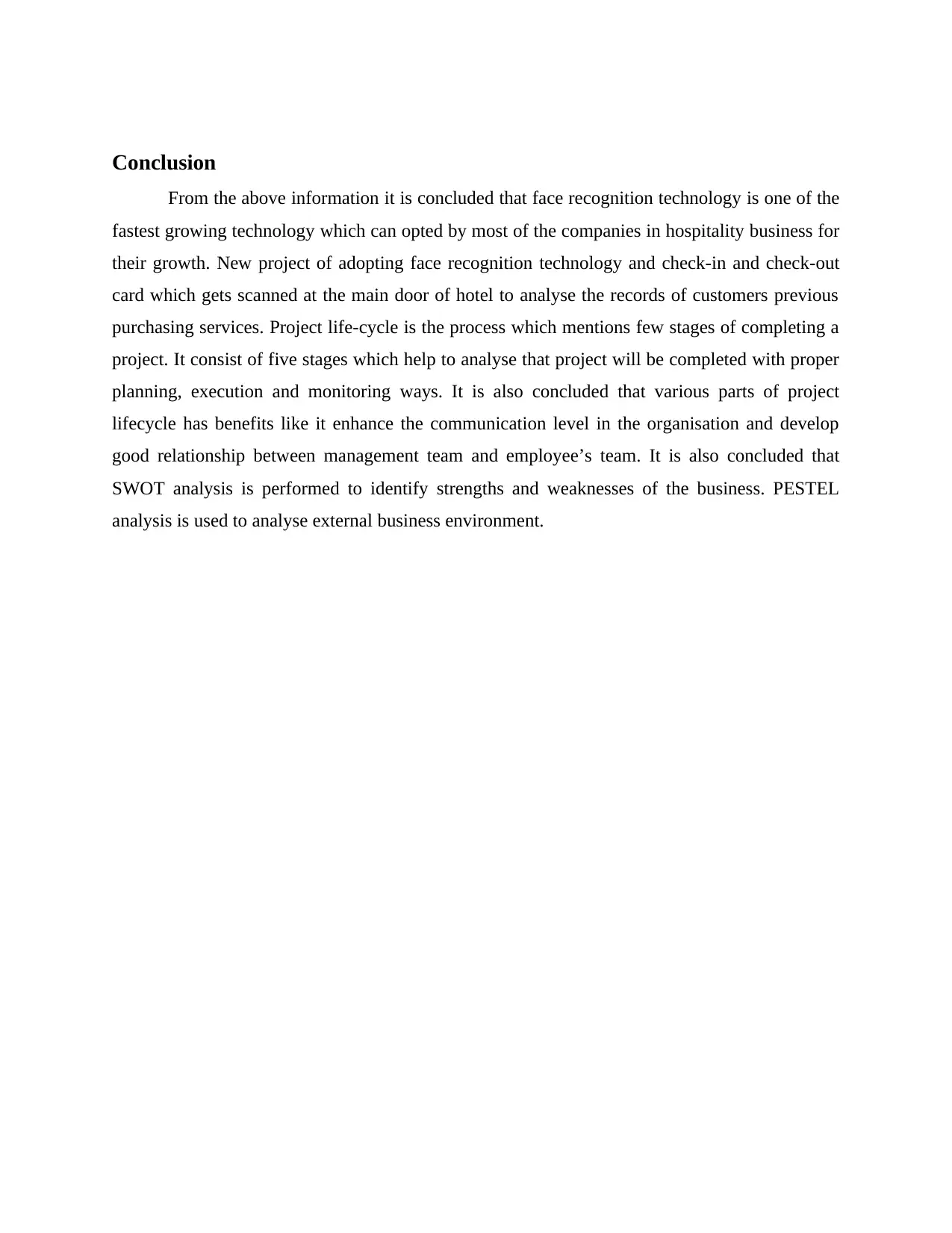
Conclusion
From the above information it is concluded that face recognition technology is one of the
fastest growing technology which can opted by most of the companies in hospitality business for
their growth. New project of adopting face recognition technology and check-in and check-out
card which gets scanned at the main door of hotel to analyse the records of customers previous
purchasing services. Project life-cycle is the process which mentions few stages of completing a
project. It consist of five stages which help to analyse that project will be completed with proper
planning, execution and monitoring ways. It is also concluded that various parts of project
lifecycle has benefits like it enhance the communication level in the organisation and develop
good relationship between management team and employee’s team. It is also concluded that
SWOT analysis is performed to identify strengths and weaknesses of the business. PESTEL
analysis is used to analyse external business environment.
From the above information it is concluded that face recognition technology is one of the
fastest growing technology which can opted by most of the companies in hospitality business for
their growth. New project of adopting face recognition technology and check-in and check-out
card which gets scanned at the main door of hotel to analyse the records of customers previous
purchasing services. Project life-cycle is the process which mentions few stages of completing a
project. It consist of five stages which help to analyse that project will be completed with proper
planning, execution and monitoring ways. It is also concluded that various parts of project
lifecycle has benefits like it enhance the communication level in the organisation and develop
good relationship between management team and employee’s team. It is also concluded that
SWOT analysis is performed to identify strengths and weaknesses of the business. PESTEL
analysis is used to analyse external business environment.
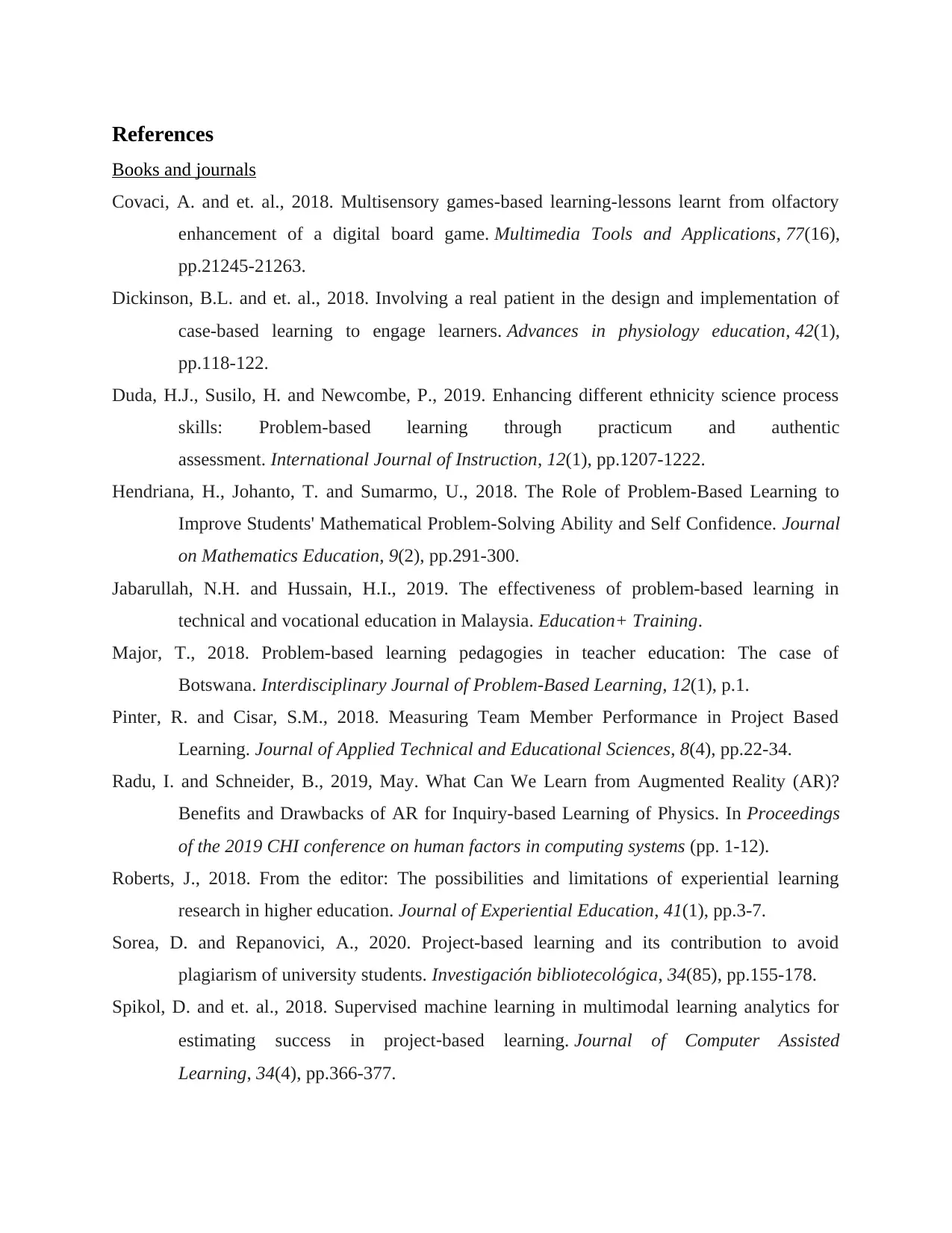
References
Books and journals
Covaci, A. and et. al., 2018. Multisensory games-based learning-lessons learnt from olfactory
enhancement of a digital board game. Multimedia Tools and Applications, 77(16),
pp.21245-21263.
Dickinson, B.L. and et. al., 2018. Involving a real patient in the design and implementation of
case-based learning to engage learners. Advances in physiology education, 42(1),
pp.118-122.
Duda, H.J., Susilo, H. and Newcombe, P., 2019. Enhancing different ethnicity science process
skills: Problem-based learning through practicum and authentic
assessment. International Journal of Instruction, 12(1), pp.1207-1222.
Hendriana, H., Johanto, T. and Sumarmo, U., 2018. The Role of Problem-Based Learning to
Improve Students' Mathematical Problem-Solving Ability and Self Confidence. Journal
on Mathematics Education, 9(2), pp.291-300.
Jabarullah, N.H. and Hussain, H.I., 2019. The effectiveness of problem-based learning in
technical and vocational education in Malaysia. Education+ Training.
Major, T., 2018. Problem-based learning pedagogies in teacher education: The case of
Botswana. Interdisciplinary Journal of Problem-Based Learning, 12(1), p.1.
Pinter, R. and Cisar, S.M., 2018. Measuring Team Member Performance in Project Based
Learning. Journal of Applied Technical and Educational Sciences, 8(4), pp.22-34.
Radu, I. and Schneider, B., 2019, May. What Can We Learn from Augmented Reality (AR)?
Benefits and Drawbacks of AR for Inquiry-based Learning of Physics. In Proceedings
of the 2019 CHI conference on human factors in computing systems (pp. 1-12).
Roberts, J., 2018. From the editor: The possibilities and limitations of experiential learning
research in higher education. Journal of Experiential Education, 41(1), pp.3-7.
Sorea, D. and Repanovici, A., 2020. Project-based learning and its contribution to avoid
plagiarism of university students. Investigación bibliotecológica, 34(85), pp.155-178.
Spikol, D. and et. al., 2018. Supervised machine learning in multimodal learning analytics for
estimating success in project‐based learning. Journal of Computer Assisted
Learning, 34(4), pp.366-377.
Books and journals
Covaci, A. and et. al., 2018. Multisensory games-based learning-lessons learnt from olfactory
enhancement of a digital board game. Multimedia Tools and Applications, 77(16),
pp.21245-21263.
Dickinson, B.L. and et. al., 2018. Involving a real patient in the design and implementation of
case-based learning to engage learners. Advances in physiology education, 42(1),
pp.118-122.
Duda, H.J., Susilo, H. and Newcombe, P., 2019. Enhancing different ethnicity science process
skills: Problem-based learning through practicum and authentic
assessment. International Journal of Instruction, 12(1), pp.1207-1222.
Hendriana, H., Johanto, T. and Sumarmo, U., 2018. The Role of Problem-Based Learning to
Improve Students' Mathematical Problem-Solving Ability and Self Confidence. Journal
on Mathematics Education, 9(2), pp.291-300.
Jabarullah, N.H. and Hussain, H.I., 2019. The effectiveness of problem-based learning in
technical and vocational education in Malaysia. Education+ Training.
Major, T., 2018. Problem-based learning pedagogies in teacher education: The case of
Botswana. Interdisciplinary Journal of Problem-Based Learning, 12(1), p.1.
Pinter, R. and Cisar, S.M., 2018. Measuring Team Member Performance in Project Based
Learning. Journal of Applied Technical and Educational Sciences, 8(4), pp.22-34.
Radu, I. and Schneider, B., 2019, May. What Can We Learn from Augmented Reality (AR)?
Benefits and Drawbacks of AR for Inquiry-based Learning of Physics. In Proceedings
of the 2019 CHI conference on human factors in computing systems (pp. 1-12).
Roberts, J., 2018. From the editor: The possibilities and limitations of experiential learning
research in higher education. Journal of Experiential Education, 41(1), pp.3-7.
Sorea, D. and Repanovici, A., 2020. Project-based learning and its contribution to avoid
plagiarism of university students. Investigación bibliotecológica, 34(85), pp.155-178.
Spikol, D. and et. al., 2018. Supervised machine learning in multimodal learning analytics for
estimating success in project‐based learning. Journal of Computer Assisted
Learning, 34(4), pp.366-377.
Secure Best Marks with AI Grader
Need help grading? Try our AI Grader for instant feedback on your assignments.
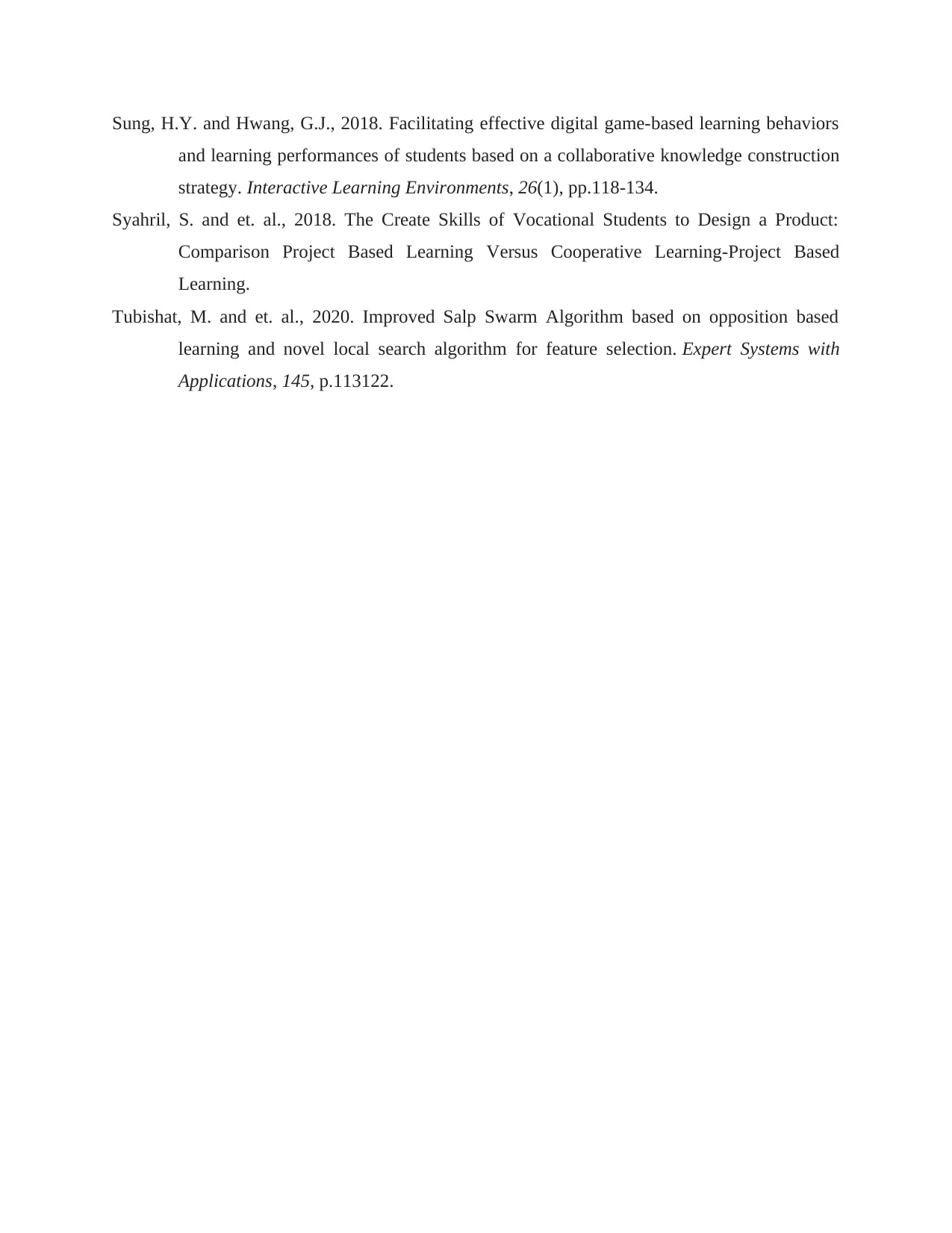
Sung, H.Y. and Hwang, G.J., 2018. Facilitating effective digital game-based learning behaviors
and learning performances of students based on a collaborative knowledge construction
strategy. Interactive Learning Environments, 26(1), pp.118-134.
Syahril, S. and et. al., 2018. The Create Skills of Vocational Students to Design a Product:
Comparison Project Based Learning Versus Cooperative Learning-Project Based
Learning.
Tubishat, M. and et. al., 2020. Improved Salp Swarm Algorithm based on opposition based
learning and novel local search algorithm for feature selection. Expert Systems with
Applications, 145, p.113122.
and learning performances of students based on a collaborative knowledge construction
strategy. Interactive Learning Environments, 26(1), pp.118-134.
Syahril, S. and et. al., 2018. The Create Skills of Vocational Students to Design a Product:
Comparison Project Based Learning Versus Cooperative Learning-Project Based
Learning.
Tubishat, M. and et. al., 2020. Improved Salp Swarm Algorithm based on opposition based
learning and novel local search algorithm for feature selection. Expert Systems with
Applications, 145, p.113122.
1 out of 11
Related Documents
Your All-in-One AI-Powered Toolkit for Academic Success.
+13062052269
info@desklib.com
Available 24*7 on WhatsApp / Email
![[object Object]](/_next/static/media/star-bottom.7253800d.svg)
Unlock your academic potential
© 2024 | Zucol Services PVT LTD | All rights reserved.





